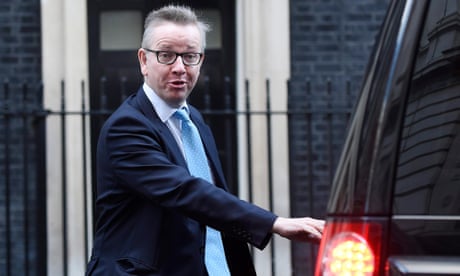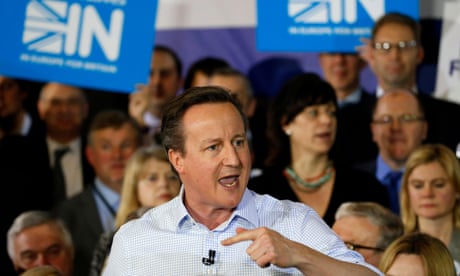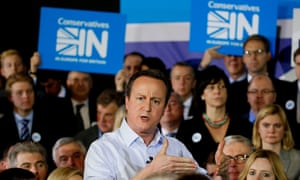Prime minister summons lawyers to challenge Michael Gove’s assertion that reforms could be thrown out by European court
Rowena Mason Political corespondent
Open warfare has broken out in Conservative ranks over the legal status of David Cameron’s EU deal after leading out campaigner Michael Gove claimed that itcould be overruled by the European court of justice.
Downing Street responded to the justice secretary’s intervention by organising statements from senior lawyers to rebut his claims, including from Jeremy Wright, the attorney general, and Dominic Grieve, his predecessor as the government’s chief law officer.

European court could challenge Cameron's deal, says Michael Gove
Read more
Conservative out campaigners went on to release their own legal opinions stating Cameron’s negotiated settlement was worthless in law, with Dominic Raab, a justice minister in the leave camp, suggesting it had less value than a guarantee for a new dishwasher.
Gove, the justice secretary, ignited the row by saying Cameron’s changes did not have any legal status because they are not yet written into European treaties. “There are two things which are true. The first thing is the prime minister is right: this is an agreement between 28 nations and all have agreed that they will abide by it. But above those nations sits the European court of justice,” he told the BBC.
The government then took the drastic step of releasing its legal opinion, with Wright saying the deal was watertight in law.
“The suggestion that this agreement does not have legal effect until it is incorporated into EU treaties is not correct,” Wright said. “It has legal effect from the point the UK says it intends to remain in the EU, and the European court must take it into account. The job of the European court is to interpret the agreements between the 28 nation states of the EU. This is one of those agreements, with equivalent legal force to other agreements such as treaties.
“That is not just my opinion – it is the opinion of this government’s lawyers, lawyers for the EU and, I suspect, the majority of lawyers in this country.”
Downing Street also cited the former director of legal services at the EU, Alan Dashwood, who said the deal was a binding legal agreement that could only be set aside with the agreement of all member states, including the UK.
It is the second big public row between senior Tory figures on opposite sides of the EU debate, after David Cameron mocked and dismissed Boris Johnson’s suggestion that a vote to leave could lead to a better renegotiation.
Advertisement
Donald Tusk, the European council president, who put together the deal, then waded into the row, confirming his view that the deal was legally binding and irreversible.
However, Gove and other leave campaigners stood their ground. Escalating the spat, Raab said the EU’s own legal advice makes clear the UK deal is “based on vague assurances”.
“This is not the kind of legal guarantee you get when you buy a dishwasher, so you get your money back if it breaks down,” he said. “Ultimately, it is crystal clear [that] the Luxembourg court will have the last word as to what sticks, and it is free to not enforce the British deal.”
In addition, Vote Leave, the main out campaign, obtained an opinion from Martin Howe QC, chairman of the Eurosceptic Lawyers for Britain group, saying the claims that the summit deal is legally binding are “highly misleading as a matter of substance”.
“The member state heads of government can only agree on an ‘interpretation’. They have no power actually to alter the treaties without going through the whole process which involves ratification by each member state in accordance with its constitutional requirements. Their interpretation is likely to be taken into account by the ECJ in a future case but plainly will not bind that court,” he said.
The House of Commons European scrutiny committee, chaired by arch-Eurosceptic Sir Bill Cash, also published a briefing from its own legal adviser, Arnold Ridout [pdf] on the deal, saying it contains “legal uncertainties”.
A further headache for Cameron emerged on Wednesday as Gianni Pittella, who speaks for the socialist group in the European parliament, threatened to try to stop elements of the UK deal, saying the welfare provisions amount to discrimination.
Advertisement
The controversy over the legal status of the deal is the first major conflict between No 10 and Gove since the justice secretary was released from collective cabinet responsibility on Saturday and said he would be campaigning for the UK to leave the EU.
Gove’s wife, Sarah Vine, has written in the Daily Mail that he was tortured about choosing between his beliefs and his loyalty to Cameron, an old friend and close political ally.
Portraying her husband as a lifelong Eurosceptic, she said: “If I’m honest, it’s all been a bit of a nightmare. Michael has been like a cat on a hot tin roof, locked in an internal struggle of agonising proportions … It was never going to be easy. But neither of us had any idea it would be such torture either. Mr Cameron was expecting opposition from all sorts of people, but not from Michael.
“When he eventually told David the truth about his feelings on the renegotiations – that he was not inclined to support the deal in its current form – the PM was genuinely, and quite naturally, shocked and hurt.”
After the day of claim and counter-claim between the camps, Cameron formally launched the official Conservative campaign to stay in the EU on Wednesday night in London, with organisers saying he is now backed by a majority of Tory MPs.

David Cameron launches Tory campaign to stay in the EU
Read more
Flanked by ministers, MPs and activists, the prime minister urged them to go out and make the case to stay in the EU “with as much force as you can, as this matters so much for the future of our country”.
He also said all countries “friendly” to the UK, such as India, New Zealand, China and Australia, want it stay in the EU.
He went on to tackle Gove’s argument that the UK could negotiate its own trade deals with other countries, saying there would be a two-year limbo period during Brexit discussions and then it could take many more years to get agreements actually signed, causing uncertainty for businesses.
The Tory remain campaign was bolstered by the declaration that they have most Conservative MPs onside but suffered earlier embarrassment after it emerged one of the 13 military chiefs purported to have signed a pro-EU letter was included by mistake.
Downing Street apologised to General Sir Michael Rose after wrongly including him in a list of former military chiefs who oppose the UK leaving the EU.





No comments:
Post a Comment